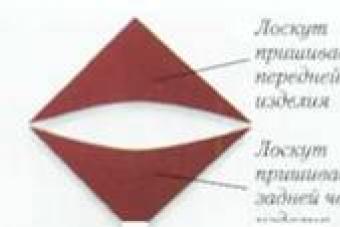Many parents are wondering: what to do with their child after school so that he spends less time sitting idle on the Internet? We have already mentioned that you should choose for a child based on his personal qualities and interests. You should not enroll him in the section where you yourself wanted to study or studied, but did not achieve success. Fulfilling your ambitions at the expense of a child is a thankless task; it’s better to let him choose his own path.
Don't enroll your child in a club when he is too young to show specific interests. Children under three years of age are best trained at home with their parents. The ages of three to five years are the time when a child begins to show a predisposition to certain activities. And you should take a close look at it.
We choose an activity based on the child’s inclinations
Music school, or fine arts club. Does your child like to draw on paper with a pencil and leave paint spots everywhere? Maybe he likes to sing, recite poetry and speak in public? Then a creative club will definitely suit him. Please note that the music and art school has a more strict grading system, division into classes, and upon completion of training a diploma is issued. The studios are more liberal, children feel freer in them and are willing to attend classes. However, the professional skills acquired in the studio are not inferior to those acquired in school.
Section of modeling, programming, mathematical circle. Is your child clearly technically minded? Does he like to assemble construction sets and draw simple diagrams? Then feel free to choose one of the three circles listed above. Please note that the programming club is more suitable for older children. But studying mathematics or modeling in preschool age will only be beneficial. Mathematics develops logical and abstract thinking and memory. Simulation improves fine motor skills and attentiveness.
Sports section. Is your child bubbling with energy? He manifests leadership qualities, perseverance, determination? Then a sports club will suit him. You can choose the sport yourself; there are no strict rules. Although it is traditionally believed that tall guys are suitable for basketball, lean and fast - for athletics, and strongly built - for wrestling or weightlifting. Ultimately, you can ask your child what sport he would like to play - he may already have wishes. If not, observe which games your child is most inclined to play. Maybe these are ball games or catch-up games?
Music school or football section, swimming pool or art school, dance studio or martial arts? Such agony of choice is not uncommon for modern parents. The school and the city today provide enormous opportunities for additional education. There are the desires and abilities of the child, the expectations and ambitions of the parents... An expert from the Association of Organizations for the Development of Humanistic Psychology in Education explains what you need to pay attention to when choosing clubs and sections for your child.
Why does a child need a boxing section or a theater club?
This is the first question that parents need to answer themselves honestly. Surveys show that there are three main vectors for choosing additional activities for a child:
- For general development
- For success and achievements
- To correct and/or overcome any personal characteristics child and communication difficulties
In the first case, the task of keeping the child busy, satisfying his current interests and developing general abilities is usually solved. Usually the family follows this path if the baby does not show any obvious abilities or inclinations for something specific. In this case, the child usually attends several clubs and studios and can often change them.
Sometimes this worries parents: it seems to them that the child’s interests are changeable and fickle, and he does not complete the task. If you look at the situation from the other side, then it is the variety of clubs and sections that opens up the opportunity for a child to try himself in different areas, groping in such a way that he is more interested in what he does better.
The second vector is chosen by the family if the child has early age shows (or parents think he shows) special abilities for something. In order to maximize the development of special abilities and achieve results in this area, parents select additional classes. Movement in this direction presupposes the child’s high employment, a transition from level to level of mastery of skills. This path is often chosen by parents - professional musicians (artists, athletes) or mothers and fathers who, for some reason, did not realize their own childhood dream of being a hockey player, violinist, dancer, etc.
The third vector is the ability to compensate for the child’s characteristics or difficulties. For example, if a child is shy and anxious, he is enrolled in a theater studio so that he can relax there. Can't stand up for yourself? For martial arts. Poor health? For swimming or figure skating. Problems with speech? To join the choir at a music school. This direction can be transformed into either the first or the second, depending on the style of family education.
Additional education exists to:
- the child could maximize his abilities;
- the child had the opportunity to feel successful in any activity;
- the child was able to form an idea of his capabilities, interests, preferences;
- the family and society were calm that the children were under supervision and were doing interesting and useful things.

Where can I find extra activities for children?
As soon as you receive an honest answer from yourself to the first question, you can decide where to solve the tasks.
In the first case, clubs at school, children's creativity studios, classes in which are built on the project principle: achieving a specific, visible practical result for some organic (not very long) period, then moving on to new tasks, are suitable. These could be school theater or music studios with the preparation of concerts and performances for holidays, sports sections with participation in competitions between classes or schools, creative workshops with the preparation of exhibitions or decorations for performances, scientific and educational clubs with preparation for the defense of design and research work etc. The main task in this case is to interest the child, hold and develop the interest that has arisen in any activity.
If you decide to develop special abilities, the child has the resources (health, character) and desire, and the parents have the time to help him achieve results in a competitive environment, you can choose a music, sports, or art school. With the understanding that these activities can hardly be called “additional”: they will take a lot of time, require a lot of work and keep the whole family busy for at least 5 years.
You also need to be prepared for the fact that even the most successful young athlete or musician will more than once be ready to give up the business on which so much time and effort has been spent, and parents and their child will have to make a difficult decision in this regard. But if the family can handle this path, the bonuses are obvious: character education, high self-organization, the ability to work, an alternative circle of communication with peers who are busy with business, and of course, special skills.
If a family wants to overcome some difficulties in the development of a child and chooses clubs and sections as a means for this, it is important to understand that in this situation (as, indeed, in any other) main principle- “Do no harm!” Parents should consult a specialist. If a child goes into sports, then it would be logical to discuss this in advance with a pediatrician and coach; if you go to a theater club or a foreign language course, then with a speech therapist; if in creative studio- then with a teacher of additional education. And in each of these cases, valuable information can be obtained in a conversation with an educational psychologist. An unsuccessful choice of a club or extra activity can either help or aggravate the difficulties that the child experiences.
How to enroll a child in clubs and sections?
When the strategic problems of choice have been solved, tactical measures need to be taken. First of all, visit open days in educational organizations(schools, children's art centers) and additional education organizations (music, sports, art schools, art schools). Information about their conduct is published on official websites.
At a minimum, open days are organized twice a year: at the beginning academic year(September) - for informational purposes, and at the end of the school year (April) - to demonstrate the results and achievements of the children. At such events, parents have the opportunity to observe at what moment the child’s eyes lit up, how teachers communicate with the children, talk with the leaders of clubs and sections, with children and parents who already attend them. Such first-hand information cannot be compared with any advertising.
When choosing a club or section for a child, it is important to remember that the best club for him is the one where he will be interested in spending time, where he will go with pleasure, and not under duress.
www.utilidad.com
To determine what your child would like to do, you can try several different directions. Take your child to trial classes in completely different clubs so that he has the opportunity to become familiar with many types of hobbies.
Sports and dance sections
Parents choose sports and dance sections to strengthen physical health children, developing their endurance and dexterity. Swimming sections and team sports clubs: football, volleyball, basketball are well suited.
Dance sections help develop plasticity, a sense of rhythm, and coordination of movements. Classic option - ballroom dancing. There are many dance schools and studios in Minsk, many of which periodically organize reporting concerts. You can visit them and make a choice in favor of one teacher or another.
Be guided by the location of the branch of the dance club; nowadays, taking a child in the evening after work across the city for a 40-60 minute class is at least strange. It is best to start by considering clubs at a school that is located as close to home as possible - this will save time.
Creative clubs
Creative clubs (drawing, applied crafts, theater studios) are chosen to develop a child’s extraordinary thinking, love of art, and also to develop perseverance.
Beading, embroidery, knitting, batik, and straw weaving are again gaining popularity, and many girls school age I will enjoy participating in these clubs.
Theater clubs allow children to learn to speak competently and move beautifully. In theater classes, memory and the ability to work in a team develop well. Ideal for children with speech problems. Children's theater performances will serve as an excellent incentive for your child to learn to speak correctly.
When choosing an activity for your child, pay attention to whether the family budget will allow the child to purchase everything necessary for activities in the chosen circle. If a child needs an expensive racket or dress for a performance, and you cannot buy it, he will develop an inferiority complex. It will be very disappointing to give up doing what you love because of financial difficulties in the family.
Carefully analyze the lesson schedule at school and try to ensure that additional classes do not take place on days when the child has a lot of difficult lessons.
Don't overload your child and don't try to teach him everything at once. It is better if he attends one circle with pleasure than falls from fatigue after attending several.
If you don’t like the teacher who conducts the classes, or the child is extremely dissatisfied with the classes, change the circle.
Choosing a club or section for a child is not so difficult if you listen to his wishes.
Dear readers! What clubs does your baby go to? How did you choose a club for your child? We are waiting for your comments!
How to choose the right club for your child
Every loving parent wants his child to develop intellectually, spiritually and physically. But the question immediately arises: when, how, and what to do with your child. The older the child gets, the more pressing the question becomes for parents, which section to send the child to, so that he will be interested, and what exactly will be beneficial for his development. Some parents are looking for developmental centers and schools for their babies, one might say from the “cradle”, others believe that the child first needs to get used to school, and only then “load” him with clubs, sections, studios. Both opinions are only half true. It is difficult for a child to perceive a large amount of information, and for a schoolchild who is not accustomed to any kind of stress, even homework will be an “overwhelming burden.” How to find the best option?
First, you need to find out what development centers there are in your city and what variety of clubs and activities they can boast of (sports, music, art, theater, dance, language, etc.). Have you decided on a circle? Then go there and scout out the situation on the spot in person. Look at the situation, talk with the teacher, with the children who study there and with their parents. Many clubs and sections offer one introductory lesson for free. Be sure to visit it with your child! If the child is satisfied and you yourself received positive emotions from your “intelligence” - go ahead! Perhaps you found exactly what you were looking for and what your child needs! At the same time, get rid of rosy illusions and big plans regarding visits to this circle in advance. After all, your child is still small and his interests and desires are unstable! Third, if you want your child to achieve significant success in any area, he should do something for which he has the ability and, in addition, where he is interested. Wise parents also think about what the child will need in life. In particular, girls have their own in connection with this, boys have their own.
Choosing a section for a preschooler is a big responsibility. However, there is no need to be tormented by doubts when choosing a club or studio for a preschooler; at this age, a child can attend several clubs and children’s associations at once (no more than two or three), since classes for children are not tiring and are built in a game form. In recent years, “Schools early development" They welcome children from 3 to 6 years old. All of them are aimed at the harmonious development of the child’s personality, do not require special abilities and talents from him, but help determine what type of activity the child has aptitude for.
Based on the above, I would like to wish parents to wisely choose your child’s activity and rest schedule. The load should be no more than 4 - 8 hours a week (depending on the child’s age), otherwise at one point he will categorically refuse everything. The child needs to have free time for playing with peers, reading your favorite books, etc.
For primary classes Club activities are also fun and educational. Usually, classes are conducted in a playful way so that children are interested in studying, the tasks do not bore them, but develop them. What abilities do various clubs, sections, and children's associations develop?
- Mathematical abilities develop rapidly in chess sections, technology sections and, oddly enough, music associations and studios.
- Music classes are suitable for both boys and girls. Here not only mathematics is learned, but also vocabulary. Music lessons in childhood promotes the active development of a child’s musical ear, the formation of first vocal skills, speech development, as well as the discovery of many other talents that you didn’t even know about!
- If you want your child to develop not only creatively, but also physically, then children’s physical education associations are suitable. They contribute physical development and coordination of movements, help the child develop persistence in his beliefs, confidence, the ability to defend himself in any situation, and willpower is developed. Sports clubs include: football, tennis, different types wrestling, swimming, athletics, etc. When choosing a sports section, ALWAYS take into account the health status of your child, whether he has any diseases for which participation in a particular sport is contraindicated. If your baby’s health is good and you are not prohibited from playing sports, then you can consider the following sections:
- group sports games - football, basketball, volleyball, hockey. - here the child will learn cohesion, teamwork, communication.
- water activities will help strengthen the immune system.
- Gymnastics will help your child develop flexibility and patience.
- martial arts will teach you how to control your body. - Girls are usually very interested in choreographic clubs, which develop motor activity, flexibility, plasticity, beautiful posture and are very helpful in overcoming fatigue after sitting at a desk at school during the day.
- In order for the child to learn to work with art materials, such as: paints, gouache, felt-tip pens, pencils, colored paper, herbarium and many others. etc., the child should be sent to an art club. There the child will learn creative education and attitude towards nature and the surrounding world.
- As a hobby, you can recommend that your child study in a vocal studio to develop a sense of rhythm, an ear for music and self-confidence.
- Theater clubs develop a child very well psychologically: fear of the public is well overcome, imagination and self-expression develop. Working in a team, children develop communication skills, speech, facial expressions, and also in the process creative activity The child's personality develops.
- Girls are often interested in beadwork; they probably paid attention to school fashion: multi-colored beaded bracelets on their hands. This is what children's arts and crafts associations teach. These clubs will definitely develop the girl’s patience, perseverance, and various creativity and visual coordination, excellent aesthetic taste and a sense of beauty are instilled, which will be very necessary in the future.
- Preschool clubs for general education of children preschool age help to acquire communication skills, develop natural abilities and acquire new knowledge necessary in the near school future .
Important points to consider
when choosing additional classes:
- First, you should determine the ultimate goal of classes in this circle - do you want to maximally develop certain abilities in your child or simply organize his leisure time and provide the opportunity for emotional release? Whatever your goal, choosing the theme of the circle is very important; try to choose a circle together with your child, focusing on his preferences and abilities, observing his behavior. If the activities in the circle bring pleasure to the child, then he will practically not get tired of them. It would be a good idea to ask where your child’s friends at school and around the yard are studying. He will be more comfortable if extracurricular activities take place within his usual social circle.
- Secondly, in most cases, additional classes for 2 hours 3 times a week will be enough for a child: more intense loads require high endurance, and different children react to the load differently. There are those who go to 5 sections at the same time and require supplements, they are always cheerful and active, and there are children for whom two classes a week is too much.
- Thirdly, do not try to fill absolutely all your free time with circles: the child should have personal time that he can occupy as he wants. The schedule of classes in the circle is also an important factor. I recommend that you coordinate this with your child’s lesson schedule. Choose days when there are fewer lessons or they are not so difficult so that the child is not overly tired, otherwise attending a club may become an unbearable additional burden for him, rather than a pleasure. It’s good if classes in a circle are possible on a weekend, but don’t choose a schedule where classes will only be on weekends, that is, two weekends will be occupied by attending a circle. Leave at least one weekend completely free for your child. After all, he definitely needs rest.
- Fourthly, if additional classes are not a sports section, then be sure to set aside time for outdoor games. Classes in sports sections provide, perhaps, the most adequate load on the body. At the same time, skeletal muscles and the respiratory system intensively develop, coordination of movements improves, skills in mastering one’s own body are honed, and the heart receives much-needed training. In addition to physical benefits, physical education and sports have an impact on the development of the human psyche: determination, the ability to endure inconvenience and control one’s desires - these are the qualities in achieving which sport can become the main assistant.
- Fifthly, if it is difficult for a child to decide, then let him go to different circles to feel his own craving for something. Patience and support are required from you, mom and dad. You can go to the first classes of clubs and sections for children with your son or daughter and then try to figure out whether the child wants to do this or not? And what will these classes give him? When looking for a suitable activity, do not be afraid to change clubs. Look for something that your child will like and suit. And if the child is disappointed, there is no need to scold him or reproach him, just discuss together why this happened and what exactly he did not like.
- Sixthly, if you decide to choose a particular section, then you need to take into account that in the future the child will attend classes independently, therefore, it is important that the section is not far from home. The most the best option The circle would be located near the school, or even better, at the school. A visit to the most beautiful club on the other side of the city is unlikely good idea. The journey will take too much time and will be very tiring for the child.
- Seventh, when choosing this or that section, pay attention to the child’s character, his temperament, because some people like to draw, while others like to play checkers. Ideally, when choosing a club for a child, it would be a good idea to consult with a psychologist to determine the child’s needs, taking into account his character, temperament, and psychological characteristics.
If the child is phlegmatic- a calm, balanced person, prone to sitting for long periods of time and becoming engrossed in one thing. Such a child is not capable of quickly and quickly responding to a situation and therefore it is necessary to choose activities with the maximum duration. Suitable for boys: sports where you need to achieve perseverance and endurance - these are athletics and weightlifting, fencing, horse riding. For girls, aerobics, athletics, and dancing are the most suitable.
Also, a universal activity suitable for both girls and boys is music and drawing.
If the child is melancholic - his temperament requires careful handling, he is vulnerable and impressionable, too emotional. Competitive sports are not suitable for such children. For boys, you can choose clubs that develop the child’s construction and design abilities. For girls, classes in a theater group, in which such children will gain self-confidence, they will get rid of the fear of public speaking.
If the child is choleric - This is a little why, always asking questions about everything in the world, he cannot sit still, he is very impetuous and can do 100 things at once in one minute, but quickly loses interest in them. When choosing a sports club, you need to approach it with caution and choose those where there is a competitive element and a lot of excitement: shooting, swimming.
If the child is sanguine - very obedient and flexible, helps parents and loved ones. But there is also a negative thing about this behavior - he is very forgetful and is unable to plan time. For boys, sports that require team play are suitable, for girls - dancing, gymnastics and swimming. Foreign languages, journalism or photography club - best choice for such a child. If you have decided on the choice of a circle for your child, then do not forget to ask the child’s opinion.
It is important to know some Features of a child’s behavior that influence the choice of a club:
1. Is the child active, expresses his own opinion without hesitation and is eager to fight to prove it? Is he annoyed by a loss that depends on someone else? For a little individualist, it is worth choosing a sport or a club where the child can achieve individual high results, and all the attention of the coach or teacher will be devoted to him. Any single sport or club that allows you to reach the final goal, relying solely on your own strength, will develop responsibility, perseverance and determination in the child.
2. Is the child friendly, with equal joy chooses both active and passive roles in the game, and the main thing for him is not victory, but participation? In this case, it is worth choosing a club for your child that develops communication within society. Any team sports or clubs will be an irreplaceable experience for such a child and will develop such wonderful qualities as empathy, friendliness and the desire for collective victory.
3. In any game does a child “try on” the role of a leader, has the opportunity to rally peers around him and captivate them with a common goal? Choosing a club for a child gifted with such abilities should be based on the availability of a team captain, group commander, stand person or teaching assistant in the given club or sport. Sooner or later, such a child will take a leading position in a small society, the main thing is that this circle assumes its presence. In this case, there is no doubt that the little leader will later become an excellent organizer with responsibility, hard work and communication skills.
4. Is the child quiet, shy, agrees with any role that his peers choose for him and is glad that he was simply accepted into the game? This is the most difficult option. On the one hand, parents can try to develop “fighting” qualities in their child by sending him to combat sports sections or clubs, where the teacher will try to “open” the shell in which the child is hiding. To some extent, this may be useful and will teach the child to defend his own opinion, regardless of the approval of others. However, you should be especially careful when choosing a club for a child of this nature. The main thing here is not to overdo it. The qualities of a fighter will be useful to the child in his future life, but such a choice can come into conflict with the child’s inner world and cause aggressive rejection of the imposed circle, which will lead to even greater closure “within oneself” and loss of contact with others.
5. For easily excitable and hyperactive children, activities such as embroidery, beading or modeling are suitable. They will help develop spatial thinking, taste and fine motor skills.
- Eighth, the health of your child also plays an important role when choosing a section, therefore, if your baby has excellent health, then all the doors of the circles are open to you, but if you have any restrictions, then there is no need to worry here, because and there is sure to be something for your child.
- Ninth, it is important to find out about additional expenses that you may incur while your child attends one or another class. These expenses can be the purchase of costumes for a performance, the purchase of equipment, payment for trips to other cities and regions, and the like. You need to know what to expect so you don't end up in an awkward situation.
- Tenthly, there are parents who say that additional visits to clubs are not necessary, they cannot give the child anything, it is just a waste of money, but this is not true. If parents choose the right section and the child is happy to attend it, then he will get new sensations, make new friends, prove himself, during classes the child’s potential will be revealed, the child will learn to plan his time.
We can talk endlessly about circles; each of them is aimed at the development of a child, at his self-affirmation in life, at organizing leisure time. If a child has abilities, they must be developed. The task of parents is to open up the boundless expanses of life for the child, to give the opportunity to “find himself”, without preventing him from making a choice that the child will make exclusively on his own. And you must agree, it is better if the child devotes most of his free time to a useful, exciting hobby rather than watching TV or playing on the computer.





